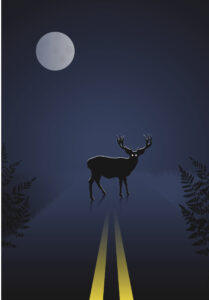The 3 Stages of Hitting a Deer
 Like a deer in the headlights: an idiom for freezing in a moment of crisis. But it’s also the truth—when you see a deer in your headlights both you and the deer suddenly cannot react to the oncoming collision. It seems inevitable, that you and this deer will collide, and there’s nothing you can do about it. Questions flash into your head: why is there a deer on the road? What should I do? Will it destroy my car? Will my insurance cover this?
Like a deer in the headlights: an idiom for freezing in a moment of crisis. But it’s also the truth—when you see a deer in your headlights both you and the deer suddenly cannot react to the oncoming collision. It seems inevitable, that you and this deer will collide, and there’s nothing you can do about it. Questions flash into your head: why is there a deer on the road? What should I do? Will it destroy my car? Will my insurance cover this?
Stage 1: Avoid Hitting the Deer
The best option is to not be in this scenario in the first place. Be vigil for the signs of deer, including literal signs about deer crossings. When you see a deer, any deer, slow down: where there’s one deer, there are bound to be more, and they tend to travel in a file. Deer tend to be nocturnal, so when driving at night–especially in wooded areas—keep your speed down and be extra vigilant.
Stage 2: While Hitting a Deer
If you’ve reached the deer-in-the-headlights stage, the last thing you want to do is swerve out of the way. Deer can cause extensive damage and even fatalities, but a much larger percentage of damage and deaths are caused from collisions with vehicles and immovable objects when attempting to avoid it. Instead hold the steering wheel with both hands, apply the brakes, and come to a complete stop. It’s safer to hit the deer than drive yourself off the road or into oncoming traffic, and if you are going to collide with a deer, reduce speed as much as possible—for both your sakes.
Stage 3: After Hitting a Deer
If you have hit a deer, first look after your own. Do not approach the deer, even if it is immobile and seems dead: it could strike you with its powerful legs. If the deer is still in the road, position your car behind it and turn on your hazard lights to avoid having anyone hit the deer. Call 9-1-1 and inform the police. When they arrive, fill out an accident report for your insurance. The police will be able to contact the correct local services to deal with the deer. Make sure to contact your auto insurance and report the accident.
What Insurance Covers Hitting a Deer?
By traditional logic you might think that colliding with a deer would be covered under the collision insurance that everyone pays for, but it is not. Hitting a deer is covered under comprehensive insurance, which covers damaged caused to your car by falling tree limbs, projectiles, fire, and other similar “acts of god” that are not attributed to human operation. If you live in a wooded or remote area, or have seen deer in the area, getting comprehensive insurance might not be a bad idea.
If you want to know more about how various insurance policies interact with damage to your person, vehicle, home, or business, or what kinds of risks area higher in your area, please contact us at the H & K Insurance Agency. We’ll help you save a few bucks.
